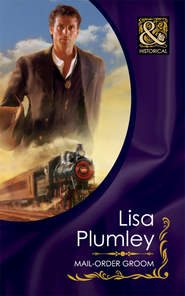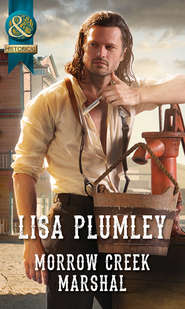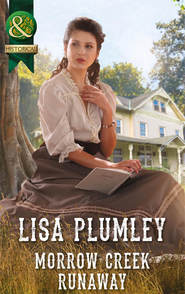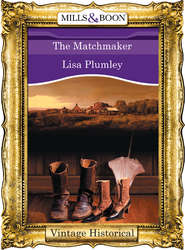По всем вопросам обращайтесь на: info@litportal.ru
(©) 2003-2025.
✖
Notorious in the West
Настройки чтения
Размер шрифта
Высота строк
Поля
He could tell by the wounded sheen in her eyes that she knew the praise he was withholding. At the same moment, Griffin realized he meant to keep right on withholding it. There was no way he’d give in. Not even to make her feel better. Not this time. If that made him as rotten as she’d said—
It did make him as rotten as she’d said, he understood just then, and felt despair rush through him. Of course his mother was right about him. She was his mother! She knew him, inside out.
“You can’t say it because you’re evil, like him.” Her voice cut into his self-condemnation, scattering his thoughts like the hot embers he shoveled all day at the glass factory. Her gaze pinned him in place, making him listen—making him endure the way she scowled at him, from his scruffy boots to his newly shorn dark hair. “You’re cruel,” she judged. “That’s the mark of it, right there on your face. Everyone can see it. Especially me.”
“No. I’m not marked.” Somehow, Griffin found the strength to raise his chin. “There’s nothing wrong with my face.”
But even as he said it, his voice quavered. His throat closed up. It ached, just like his hands did. He’d clenched his fists, he saw, without realizing it. Because he knew his mother was telling the truth. After all, people had stared at him his whole life. They’d pointed and whispered. They’d laughed.
They’d turned away. Away from him.
Even at the glass factory, where he’d earned some respect, they’d nicknamed him Hook. Hook Turner. Griffin hadn’t blamed them for that. His oversize hook of a nose was conspicuous. The nickname had begged to be given. But now he wondered...
Did everyone see what his mother did when they looked at him? Did everyone see his lack of character, his lack of strength, his lack of goodness?
You’re evil, he heard her say again, so callously and calmly. You’re rotten inside. You’re cruel. Everyone can see it.
Reliving those words, Griffin felt a hot rush of shame. There was no point sidestepping the truth. Ever since his voice had deepened and his shoulders had widened, his features had matured, too. He’d definitely inherited his father’s nose.
And with it, it seemed, his father’s wicked nature.
All Griffin could remember now of his father was his husky laughter and—hazily—his face, with its similarly prominent hawklike nose and incongruously merry eyes. Edward Turner had been scarred by the same disfigurement that now marked Griffin.
He’d been made uglier by it, even to his wife.
Of course he had. After all, everyone knew that having a good moral character was what made someone nice to look at. Virtuous women were beautiful. Decent men were handsome. That was why they were admired. Griffin didn’t know how he’d let himself overlook that fact. Maybe he’d just needed to. Until now.
“That’s the inheritance of the Turner men,” his mother went on. “I’d hoped you’d be spared. Now I can see you were not. You’re rotten, through and through.” She gave him a punishing look, confirming it. “It’s as plain as the nose on your face.”
If that was meant to be a joke, it wasn’t funny.
From somewhere, though, Griffin found a glimmer of defiance. Maybe this didn’t have to be the end of him—the end of hope for him. It was whispered that, someplace in the city, Edward Turner was prospering. That he’d made good, despite his glaring nasal defect. Maybe Griffin could do the same.
Not that his father’s success meant much to his starving and abandoned family. To them, he might as well have been dead.
Maybe he hadn’t been able to bear the sight of his son....
Griffin fixed his spine. “It doesn’t matter. I’ll work.” I’ll work like my father did. “I’ll overcome it.”
At that, his mother burst out in unpleasant laughter. “You can’t overcome that, boy!” She pointed. “It’s ludicrous to try.”
But Griffin knew that he could. He had to. What other choice was there? He couldn’t go through life with his hated defect being all that people saw when they looked at him.
It was bad enough that he was helpless to hide it. He couldn’t wear a bandito’s bandanna, like a desperado from a dime novel. His only hat wasn’t big enough to obscure his face. And now, with his hair cropped so closely, his nose was even more noticeable. No wonder his mother had chosen today to tell him these things. Doubtless, she’d taken one look at his protruding feature and been overcome. That was why she’d been so cruel.
She hadn’t been able to help herself.
It had been for his own good, he reckoned.
He had to make up for his flaw somehow, Griffin knew. He had to amass other things, things that would compensate for his appearance. Things that would make him wealthy, make him whole, make him a real man—a real man who wasn’t afraid of rats, didn’t make coffee for the womenfolk and refused to be called Hook Turner by those knucks at the glass factory. Whatever it took, Griffin vowed, he would remake himself into someone stronger.
He couldn’t remake himself into someone better. He knew that now. Given his birthright, he couldn’t be good. So he would have to settle for being strong. Being hard. Being tough.
He would have to settle for being invulnerable.
As a first step, Griffin schooled his face into an impassive mask. It was sorely difficult, but he did it. Then he drew in a deep breath. He looked squarely at his mother.
“Someday,” he said, “you’ll know you were wrong about me.”
She gave him a dubious look. Pointedly, she glanced away.
“Someday,” he added, pushed by her obvious skepticism, “you’ll be proud to call me your son.”
His mother’s obstinate expression didn’t change. Neither did her refusal to acknowledge his promise. But Griffin didn’t care. He couldn’t allow himself to care. He wouldn’t.
What he lacked in other ways—what he longed for and couldn’t have—he could make up for with single-mindedness, Griffin reasoned. His mother might be stubborn—too stubborn, even, to love him—but he was stubborn, too. Stubborn and smart and ready to work his fingers to the bone to earn his success. Whatever it took to change his life, he would do it.
“You will be proud of me,” he repeated. “I swear it.”
Then, without waiting for his mother to answer him, Griffin left her with her cold coffee and her charity Irish stew and went to figure out how he could most quickly make his fortune.
Because everything started with money, he knew...and ended with him forcing the world to admit it was wrong about Griffin Turner and what he was capable of—hawklike nose and all.
Chapter Two
June 1872, Morrow Creek, northern Arizona Territory
As a girl who had never experienced neuralgia, lassitude or vexing biliousness, Olivia Mouton should not have felt drawn to the traveling medicine show that came to town on the Sunday after her thirteenth birthday. But there was something about the peddler’s intriguing medicinal claims that pulled her nearer.
“This latest miracle elixir will end nervous troubles and colonic maladies alike. It will restore youth and vigor!” The charming peddler, finely dressed in a woolen suit with a fancy waistcoat, held aloft a full glass bottle. Its label was typeset with an impressively diverse list of the ailments it purported to achieve a remedy for. The man wasted no time explaining his wares’ efficacy. “Wise lore from the savage! Grandmother’s soothing tinctures! Scrupulous scientific approaches! All are represented here!” He gave a graceful gesture, then grinned invitingly at the crowd. “Step right up and see for yourselves.”
Interestedly, Olivia examined the wares he’d arrayed in tidy rows atop his wagon’s hinged backboard. There were brown and green bottles full of distillations, cork-stoppered vials of fascinating tonics and flat tins of curative powders. There were jars of creams and ointments, sachets of dried herbs and boxes of exotic-smelling teas printed with celestial characters. There was even a selection of preserved exotic fruits, which—according to their labels—could improve “stamina.” Olivia knew it was unlikely that the medicine show’s merchandise could accomplish even half the things the peddler promised in his spiel, but that hadn’t stopped an eager crowd from forming.
After all, his arrival was the single most exciting occurrence in sleepy Morrow Creek township since the circuit judge had rode in a week or so ago...and promptly gotten too drunk on mescal to hear any cases or cast any judgments on wrongdoers.
Most days, nothing much happened in her tiny territorial hometown. Miners trudged off to their claims in the surrounding mountainside. Rail workers toiled on the incoming rail spur, felling the obstructive ponderosa pines and laying track past the burbling namesake creek. Wives and laundresses went about their chores and tended their children with dusty equanimity.
Someday, perhaps, Morrow Creek would be a bustling place, full of vigor and industry and stirring intellectual societies. At the moment, though, Olivia’s rough-hewn hometown lacked everything from a decent mercantile or a completed rail depot to a proper schoolhouse. Lessons were sporadic and held outdoors. The town leaders were attempting to woo an instructor from the East to educate the youth of Morrow Creek. Given their current rate of progress, such a teacher’s potential students would have long gray beards before that teacher’s hiring was complete.
It was fortunate for Olivia that her father was so brilliant. Without Henry Mouton’s tutoring and encouragement—and willingness to barter with the J. G. O’Malley & Sons traveling book agent who occasionally came through town—Olivia would have been in quite a fix herself. As it was, she spent less time studying, though, than she did helping with the day-to-day duties of running her beloved father’s nascent hotel business. At the moment, The Lorndorff Hotel was not much more than a few nailed-together timbers for beams, an array of canvas for walls and several lumpy beds. But someday, Olivia knew, the hotel would define Morrow Creek as a place for sophisticated and educated folk to gather, converse and entertain socially.
The collecting crowd was right to be interested, Olivia reasoned as the peddler’s avowals grew ever more animated and persuasive. At least some of the claims the man was making had to be true. This was the nineteenth century after all! Miraculous scientific achievements had taken place.
Some of those achievements had been made by women, too. Olivia knew that because she loved to read. She’d learned about Mary Fairfax Somerville’s experiments with magnetism and about Maria Mitchell’s astronomical discovery of her new comet. Olivia had daydreamed about creating and publishing botanical photograms like Anna Atkins or unearthing a Plesiosaurus fossil like Mary Anning. She’d thrilled to periodical accounts of Lady Augusta Ada Byron’s invention of the analytical engine. Of course, she also idolized pioneering medical professionals such as the physician Elizabeth Blackwell and the tireless nurse Florence Nightingale. To Olivia, those women were true heroines.
While her best friend Annie’s oak bureau held hairbrushes and pearled pins and precious scraps of scented soap, Olivia’s makeshift crate-turned-nightstand held Familiar Lecturers on Natural Philosophy by the intellectual Almira Hart Lincoln Phelps. The work was somewhat dated, but it was fascinating—as was The Mechanism of the Heavens by Mary Somerville, another of her favorites. Naturally, Olivia also treasured her well-thumbed copies of texts by authors such as Charles Darwin and Jean-Baptiste Lamarck, but she preferred reading the work of female scientists and scholars. Somehow their achievements felt all the closer to her own life...and all the more real for it.
Even if those women didn’t live in a single-street Western town with not much more to brag of than a church, a popular saloon and more tobacco spittoons than were strictly reasonable.











